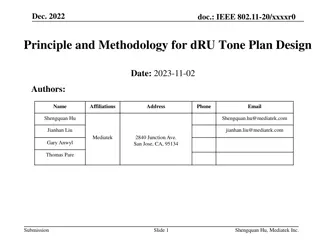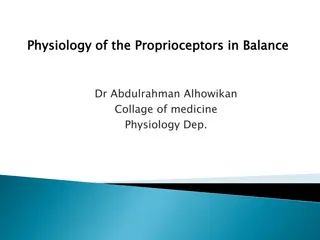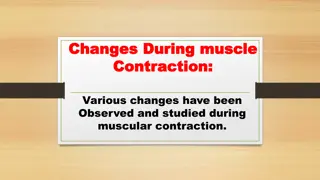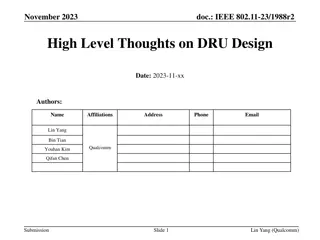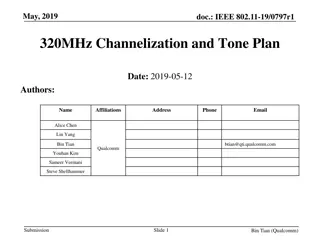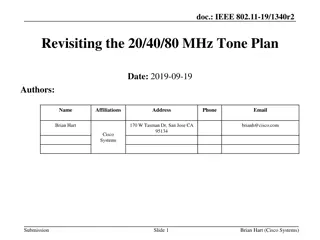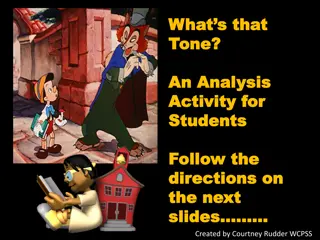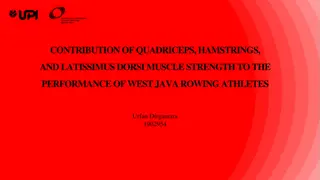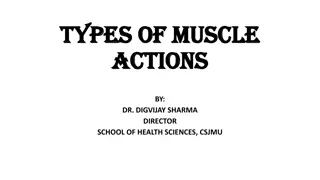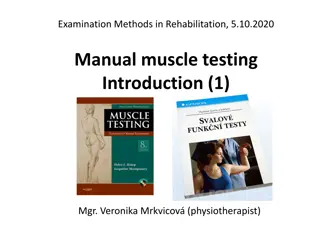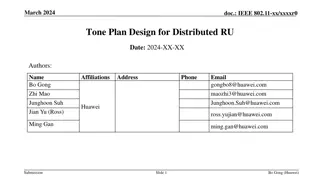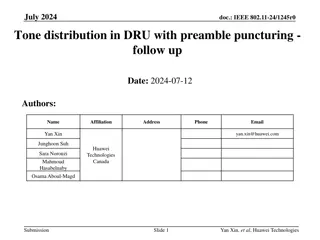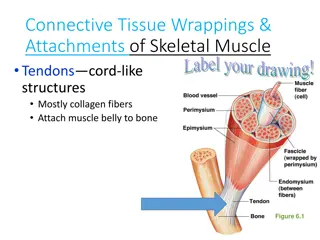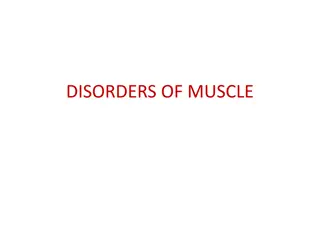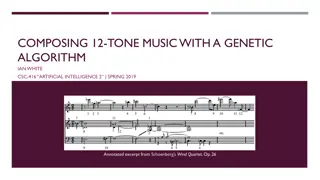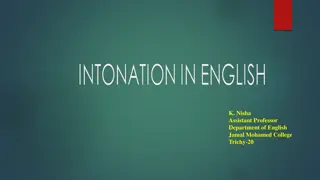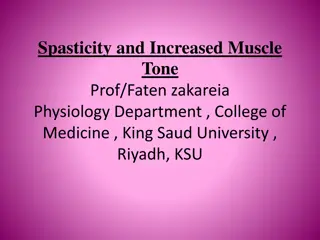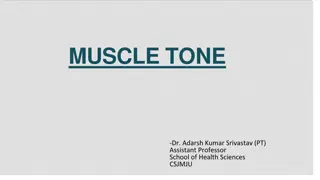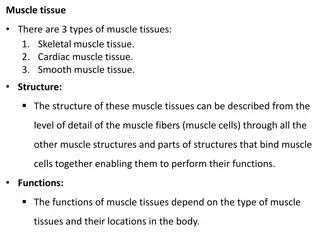Intonation and Tone in Phonetics
Intonation and tone play crucial roles in conveying meaning and expression in spoken language. Intonation refers to the melodic pattern of speech that can indicate various emotions or grammatical functions, while tone represents the pitch, quality, and strength of vocal sounds within words. By maste
4 views • 27 slides
Principle and Methodology for dRU Tone Plan Design in IEEE 802.11-20
Introduction of Distributed Tone RU (dRU) as a potential UHR PHY feature to address PSD limitations for 6GHz LPI and enhance Rate vs. Range performance. Emphasis on dRU tone plan design criteria, methodologies, and performance simulations. Detailed examination of design principles, methods, consider
4 views • 23 slides
Skeletal Muscle Relaxants and Neuromuscular Blockade
Skeletal muscle relaxants are used to induce muscle relaxation during surgeries. Neuromuscular blocking agents act at the neuromuscular junction. These drugs can either peripherally reduce muscle tone or centrally cause muscle paralysis. Different types of muscle relaxants are classified based on th
6 views • 23 slides
Boost Muscle Tone and Recovery with EMSFuse in Just 15 Minutes a Day!
Experience Enhanced Muscle Toning with EMSFuse: Revolutionize your fitness routine with EMSFuse, the cutting-edge solution for muscle toning and recovery. Harness the benefits of EMS to build stronger muscles, alleviate pain, and speed up healing. Achieve optimal fitness results in just 15 minutes d
1 views • 8 slides
Proprioceptors and Their Role in Body Balance
Proprioceptors play a crucial role in providing information about the position of body parts, muscle spindle response to stretch, and muscle tension regulation. Muscle spindles and Golgi tendon organs are key components in maintaining muscle tone and ensuring proper reflex actions. This article delv
1 views • 23 slides
Muscle Contraction Phases and Responses: A Comprehensive Overview
Various changes observed during muscle contraction include the latent period, contraction phase, and relaxation phase. Muscle twitch, tetanus, and their durations are important phenomena in understanding muscle physiology.
0 views • 14 slides
Hypotonia in Infants: Causes, Evaluation, and Management
Hypotonia, which is reduced muscle tone, can present challenges in infants affecting their motor skills and posture. This article explores the definitions, physiology, differences in central and peripheral causes, evaluation methods, and management options for hypotonia. It discusses relevant termin
0 views • 40 slides
High-Level Thoughts on Distributed Tone Resource Unit (dRU) Design in IEEE 802.11-23/1988r2 November 2023
Various aspects of Distributed Tone Resource Unit (dRU) design in IEEE 802.11-23/1988r2, such as PSD limitations, distributed transmission regulations, application areas, and open questions are discussed in this presentation by Lin Yang from Qualcomm. Topics include tone distribution, power pooling
0 views • 19 slides
Electromyography (EMG) and Motor Neurons
Electromyography (EMG) is an electrodiagnostic technique used to evaluate muscle health by measuring electrical activity. EMG measures muscle response to nerve signals, displayed as waves on an oscilloscope. Motor neurons transmit signals from the brain to muscles, enabling movement. Upper motor neu
2 views • 8 slides
Tone, Mood, and Atmosphere in Literature
Atmosphere, mood, and tone are essential elements in literature that shape the emotional tone of a literary work, influence reader expectations, and convey the author's attitude. They are interconnected yet distinct aspects that add depth and complexity to storytelling. This analysis delves into the
0 views • 12 slides
The Histological Structure of Muscle Cells
This presentation delves into the histological structure of three types of muscle cells - skeletal, cardiac, and smooth muscles. Learn about their differences, such as striation, voluntary vs. involuntary control, and cellular organization. Discover the components of muscular tissue, the coverings o
0 views • 13 slides
Channelization and Tone Plan Discussion for 320MHz EHT
IEEE 802.11-19/0797r1 discusses the channelization and tone plan design for 320MHz in EHT (11be). The slides cover the benefits of a 320MHz channel, double peak throughput, various BW modes, existing and new configurations, and proposals for tone plans to maximize efficiency. Detailed considerations
0 views • 10 slides
Revisiting the IEEE 802.11-19/1340r2 Tone Plan Optimization
Revisiting the tone plan optimization for IEEE 802.11-19/1340r2, addressing issues with RUs near band edges, accommodating various STA bandwidth capabilities, and the inefficiencies of non-SST 11ax STAs in different BSS scenarios. Proposals include adapting to unknown future 11ax features, minimizin
5 views • 12 slides
Tone and Mood in Text Analysis Activities
This activity guide created by Courtney Rudder of WCPSS provides students with text excerpts to analyze for tone and mood. Students work in pairs to discuss the text and use a list of tone and mood words provided to help them. The guide progressively offers more challenging texts for analysis, encou
1 views • 9 slides
Tone and Mood in Writing
Explore the concepts of tone and mood in writing, how they are defined, and their impact on creating an atmosphere and eliciting emotions in the reader. Discover how tone reflects the author's attitude and the multiple tones that can exist in a piece of writing. Dive into the general atmosphere crea
0 views • 34 slides
The Hemiplegic Arm and Hand After Stroke
A stroke can cause weakness in the arm and hand, affecting movement and daily tasks. Careful handling reduces pain and complications. Common issues include pain, swelling, altered sensation, and muscle tone changes. Limbs may have low tone (limp) or high tone (stiff), leading to challenges in moveme
0 views • 11 slides
Tone in Literature: An Analysis of Hamlet
Explore the concept of tone in literature through examples from Shakespeare's "Hamlet." Learn how tone influences the reader's emotional response and enhances understanding of a piece of writing. The analysis delves into Act One, Scene One to reveal the tension and tone Shakespeare sets up in the pl
0 views • 10 slides
Contribution of Quadriceps, Hamstrings, and Latissimus Dorsi Muscle Strength to Rowing Performance in West Java
Rowing is a demanding sport that requires strong leg muscle strength for optimal performance, particularly in West Java where rowing athletes train. This study aims to investigate the contribution of quadriceps, hamstrings, and latissimus dorsi muscle strength to the performance of rowing athletes i
0 views • 16 slides
Spasticity and Increased Muscle Tone in Neurological Disorders
Spasticity and increased muscle tone are common features in neurological disorders, characterized by hyperactive stretch reflexes and muscle contractions. Spasticity is velocity-dependent and associated with upper motor neuron lesions, leading to increased resistance to passive movement. Rigidity, o
0 views • 28 slides
Unveiling Writing Strategies: Theme vs. Topic Focus and Emphasis on Tone by Emily Mowery
Dive into the nuances of topic vs. theme in literature with a focus on analyzing tone. Explore writing activities, examples from "Poisonwood Bible," tone word banks, and engaging tone activities to enhance students' comprehension and creative expression.
0 views • 11 slides
Types of Muscle Actions in Physiology
Explore different types of muscle actions, including isometric contractions, isotonic contractions, concentric contractions, eccentric contractions, isokinetic contractions, and iso-inertial contractions. Each type plays a crucial role in muscle function and movement, with varying effects on muscle
0 views • 14 slides
Importance of Manual Muscle Testing in Rehabilitation
The assessment of muscle function is crucial in various medical exams, showing correlations with quality of life, work productivity, and aging-related issues. Manual muscle testing is commonly used by healthcare professionals to evaluate muscle strength and guide treatment plans. Assessing muscle fu
0 views • 54 slides
Tone Plan Design for Distributed RU in IEEE 802.11 Standards
This document discusses the design of tone plans for Distributed Remote Units (DRUs) in IEEE 802.11 standards. Three main tone plans are proposed: Group based tone plan, Pilot tone power boosted tone plan, and Unified DRU Tone Plan. The group based tone plan focuses on separating pilots, reducing ch
0 views • 26 slides
Tone and Mood in Literature
Tone refers to the author's attitude towards the subject, while mood is the emotional atmosphere of the text. The difference lies in how the author feels versus how the reader feels. Understanding and analyzing tone involves considering aspects like diction, imagery, figurative language, and syntax.
0 views • 14 slides
Character Analysis of Mrs. Schulewitch and Adam Seth from Over the Bridge
Explore the character analysis of Mrs. Schulewitch and Adam Seth from the novel "Over the Bridge" by Todd Strasser. Uncover their communication style, history, appearance, relationships, ambitions, character defects, thoughts, everyman-ness, and restrictions. Dive deep into the tone of the song and
0 views • 4 slides
Tone Distribution in DRU with Preamble Puncturing
The document discusses tone distribution in Distributed RU (DRU) with preamble puncturing in IEEE 802.11 networks. It explores the impact of preamble puncturing on subcarrier distribution and proposes solutions to optimize tone plans in DRU designs. Various rearrangements and tone distribution strat
1 views • 23 slides
Skeletal Muscle Relaxants and Muscle Contraction Mechanisms
Skeletal muscle relaxants play a crucial role in relaxing muscles without affecting consciousness significantly. They are classified into neuromuscular blockers and spasmolytics, each targeting different mechanisms in the body. Muscle contraction occurs through the release of acetylcholine and the s
0 views • 27 slides
Connective Tissue Wrappings and Skeletal Muscle Structure
Exploring the connective tissue wrappings and attachments of skeletal muscles, this content highlights the cord-like structures, collagen fibers, and their role in connecting muscle bellies to bones. It also delves into the surrounding connective tissues such as fascia, epimysium, perimysium, and en
0 views • 11 slides
Overview of Muscle Disorders and Muscular Dystrophies
The human body consists of over 600 muscles, divided into skeletal, smooth, and cardiac muscles. Diseases of skeletal muscle encompass myopathy, myositis, and muscular dystrophy. Muscle disorders are categorized into genetic muscular dystrophies, channelopathies, inflammatory myopathies, and endocri
0 views • 32 slides
Composing 12-Tone Music with Genetic Algorithm - An Exploration
This annotated excerpt delves into the world of 12-tone music composition using a genetic algorithm approach. The essence of 12-tone music, its historical roots, and the simplifications made for the algorithm's purposes are discussed. The piece structure, transformations, and an initial task involvi
0 views • 15 slides
Basic Histology and Tissue Types
Explore histology, tissues, and types of tissues including epithelial, connective, muscle, and nerve tissues. Learn about tissue characteristics, differences, and functions, as well as details on specific tissue types like cardiac muscle, bone tissue, skeletal muscle, and smooth muscle. Delve into e
0 views • 74 slides
Analysis of Trump's First 100 Days News Coverage
Explore the news coverage of Trump's first 100 days in office, focusing on who dominates the narrative, the key topics covered, tone of coverage, and how it varied by news outlets and over time. Data from Media Tenor spanning Jan 20 to Apr 29, 2017, reveals insights on talking time allocation, cover
0 views • 11 slides
Spasticity and Muscle Tone Disorders
Spasticity is a motor disorder characterized by increased muscle tone and exaggerated reflexes, typically associated with upper motor neuron lesions. This article explains the differences between upper and lower motor neuron lesions, the neurophysiology of spasticity, causes, effects, and treatments
0 views • 23 slides
Muscular System Jeopardy - Learn About Muscle Functions and Facts
Explore the Muscular System Jeopardy game to understand how muscles work, muscle group names, exercises to build muscles, and the importance of healthy muscles. Discover interesting facts about muscle function, including how messages from the brain trigger muscle contractions, the role of tendons in
0 views • 52 slides
Developing Drawing Techniques for Tone in Lower KS2 - Lesson 2
In this lesson, students will enhance their drawing skills by experimenting with techniques such as cross-hatching, blending, and stippling to create tone. They will learn about key terms like light, medium, dark, shadow, and highlight, and engage in activities that help them understand the importan
0 views • 5 slides
Mastering English Intonation: Key Principles and Tone Groups
Discover the importance of intonation in English speech and how it can convey different meanings through primary stress and tone choices. Explore the significance of tone groups and the impact of pitch movement on word prominence in sentences. Learn how the selection of tones, such as falling tone,
0 views • 8 slides
Spasticity and Increased Muscle Tone
Spasticity, a feature of altered muscle performance, occurs in disorders of the central nervous system leading to Upper Motor Neuron Syndrome (UMNS). It is characterized by increased resistance to passive stretch, stiffness, and exaggerated tendon jerks. In UMNS, features include weakness, spasticit
0 views • 23 slides
MUSCLE TONE
Muscle tone is crucial for maintaining muscle relaxation and function. Abnormalities such as hypotonia, hypertonia, spasticity, rigidity, dystonia, and others can impact movement and overall health. Learn about the causes, symptoms, and implications of these tone abnormalities.
0 views • 22 slides
Overview of Muscle Tissue Types and Functions
Muscle tissue consists of skeletal, cardiac, and smooth muscle tissues, each with unique structures and functions in the body. Skeletal muscle enables conscious movement, while cardiac muscle pumps blood through the heart. Understanding the basic structure of muscle fibers and their connective tissu
0 views • 8 slides
Skin Tone Evening Creams for a Smooth, Even Complexion
Transform your skin with Sw1shop.com skin tone evening creams. Say goodbye to uneven skin tone and hello to a radiant complexion. Shop now!\n\n\/\/sw1shop.com\/collections\/tone
4 views • 1 slides

